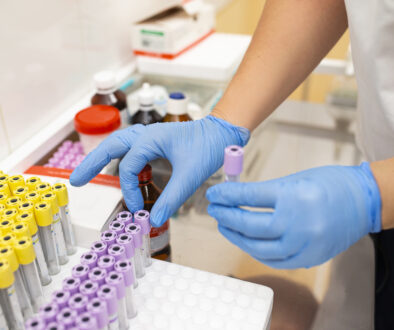Is it time for your daughter’s first OBGYN annual exam?
While your OBGYN annual exam is a regular part of your routine, your daughter may be anxious or nervous—particularly if this is her first time visiting the gynecologist.
“We understand that the first exam can be a stressful experience, but it doesn’t have to be,” said Dr. Martinelli. “We want your daughter to be as comfortable as possible, and we will provide assurance that she can talk to us about any concerns she has. This first appointment is important because it starts her on the journey to good gynecological health.”
By implementing a few of these guidelines, you can help make this a positive experience and instill a healthy habit that will serve her throughout her life.
At Chapel Hill OBGYN, we don’t feel there is a set age when teens need to start seeing us, unless they are having problems with their periods or if they aren’t comfortable discussing sexual health with their pediatrician or family doctor.
Explain to Your Daughter Why an Exam is Important
An OBGYN annual exam is about much more than getting a Pap smear. It’s about providing accurate information about her periods, sexually transmitted infections and HPV vaccinations.
If your daughter is experiencing pelvic pain, irregular or missed periods, we can help. Let her know that we can provide treatment for these problems.
Typically, unless there is a problem, we will not actually do a pelvic exam the first time we meet a new teen patient. We tailor each visit to what will serve our patients best. If a teen wants or needs to start contraception, a pelvic exam is not required in every circumstance.
Explain to Your Daughter What an OBGYN Annual Exam Is Like
Your daughter may be understandably nervous or embarrassed. Assure her that we are professionals who have performed hundreds of annual exams. Answer any of her questions and talk openly about any fears she has.
Tell her what goes on during an annual visit and be very honest with her. If you were nervous during your first exam, it may help to share this.
We typically recommend starting Pap smears when your daughter turns 21. A Pap smear and a pelvic exam are two separate components of a GYN visit.
It’s important to remember that an exam with a speculum is not always a Pap smear. A pap smear is the way we screen for cervical cancer and requires a speculum to be placed in the vagina.
A speculum exam may also be done to evaluate abnormal discharge, screen for Sexually Transmitted Infections (STI), or even look for retained tampons.
If your daughter is having problems with her periods, heavy vaginal discharge, itching or other problems, then a pelvic exam may be in order.
It may help to ensure her that the pelvic exam or Pap smear does not take long, and while it may be uncomfortable, it shouldn’t be painful. Slow, deep breaths can help her relax which will make the examination easier.
It may be useful for her to make a list of questions she would like to ask us.
A Few Questions We May Ask
It’s a good idea to prepare her for some questions we may ask. These include:
- When was your last period?
- Do you have abnormal periods?
- How long do your periods typically last?
- Do you have extremely painful cramps? [link to blog https://chapelhillobgyn.com/blog/painful-periods/]
- Are you sexually active?
- If you are sexually active, do you use birth control or a condom?
- Did you receive the HPV vaccination?
While some of these questions may make her feel awkward, please encourage her to be absolutely honest with us.
Not all of our questions will focus on sexual health. We may also ask about her general and emotional health. This involves subjects such as if she experiences extreme mood changes, if she uses alcohol, if she exercises regularly and if she maintains a healthy eating plan.
We care about the entire patient, and we want to promote good health in all aspects of your daughter’s life.
Alone Time With the Doctor
While you are welcome to be in the examination room with your daughter, we’ve found that having some one-on-one time with her providers can be beneficial. This not only helps her get to know her doctor but sometimes daughters can be more candid without parents in the examination room.
Explain to Her That We are the Most Reliable Source of Information
There are a lot of myths and misconceptions about everything from birth control to sexual health. Your daughter may have heard some of these at school or discovered them on the internet.
Please let her know that we are the most reliable source of information for her, and we are always available to answer any questions.
If your daughter turns to the internet for answers, encourage her to only visit reputable sites, such as the teen information section of the site for the American College of Obstetricians and Gynecologists.
We Want to Be Your Daughter’s Medical Home
We have been privileged to serve several generations of the same family. We’ve treated mothers and their daughters and even their granddaughters. We understand that this is a sacred trust. We will treat your family as if they were our own.
This is one of the many benefits of being a patient at Chapel Hill OBGYN: We combine the individual attention of a smaller practice with state-of-the-art care found at larger, university-based organizations.
If it’s time for your daughter to start having annual exams, please talk to us. We’d love to work with you to ensure this is a positive experience for her.
For more than 40 years, Chapel Hill OBGYN has served women in the Triangle area, sharing the joy of little miracles and supporting them during challenges. Our board-certified physicians and certified nurse midwives bring together the personal experience and convenience of a private practice with the state-of-the-art resources found at larger organizations. To schedule an appointment, please contact us for more information.




